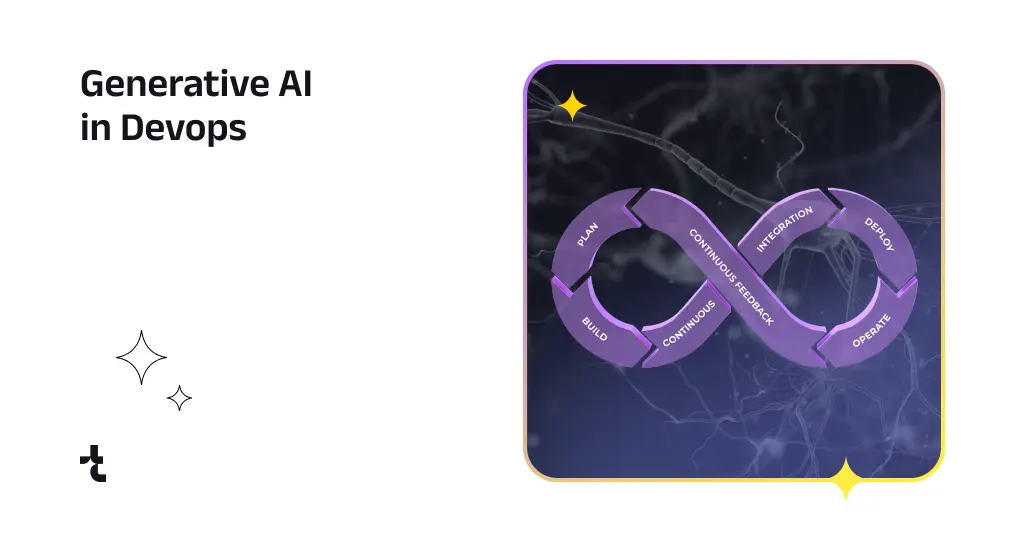How Can a DevOps Team Take Advantage of Artificial Intelligence
April 2, 2025
Teams are constantly seeking ways to improve the efficiency, reliability, and overall quality of their products. Here, DevOps, a set of practices that combines software development and operations, aims to shorten the development life cycle and provide continuous delivery with high software quality. But even with DevOps, there’s always room for improvement, and that’s where artificial intelligence makes a huge contribution.
In the post, we explore how to apply AI for DevOps teams and make these processes even smarter, faster, and more predictable.
Understanding AI for DevOps
Artificial Intelligence is the simulation of human intelligence in machines programmed to think like humans and mimic their actions. When DevOps and artificial intelligence work together, you can automate complex processes, predict outcomes, and get insights that humans might overlook, significantly enhancing the DevOps workflow.
So, how can a DevOps team take advantage of artificial intelligence? Let’s break down the most popular use cases, starting with the good old mundane routine automation.
Automated code reviews and testing
One of the first areas where AI impacts DevOps is in code reviews and testing. Traditionally, reviewing code for errors and ensuring it meets quality standards is time-consuming and prone to human error. AI-driven tools can automate this process, quickly scanning through code to identify bugs, security vulnerabilities, and coding standard violations. Moreover, AI can learn from past commits and reviews to improve its accuracy over time.
For instance, consider a tool like DeepCode, which uses AI to analyze your code and offer suggestions for improvement. With it, you have an expert to review your code that is faster and available 24/7. Such automation speeds up the development process and helps maintain high-quality code standards.
Predictive analytics for better decision-making
Predictive analytics is another area where AI shines in DevOps. By analyzing historical data, AI can predict future trends, potential failures, and the impact of changes in the development process. This information is invaluable for making informed decisions and preventing issues before they arise.
Imagine deploying a new feature and being able to predict how it will affect your system’s performance or if it’s likely to cause any downtime. With AI, this is possible. Tools like Splunk or New Relic use AI to monitor applications and infrastructure, providing real-time insights and predictive analytics to help teams anticipate and mitigate risks.
Enhanced monitoring and incident management
Monitoring systems and managing incidents are critical components of DevOps. AI enhances these processes by not just reacting to issues but predicting them before they happen. Through machine learning algorithms, AI can analyze logs, metrics, and patterns to detect anomalies that could indicate potential problems.
When an incident occurs, AI can also assist in diagnosing the issue, suggesting potential fixes, and even automating the resolution process in some cases. The proactive approach to incident management can significantly reduce downtime and improve system reliability.
For example, IBM’s Watson AI has been used to predict and prevent IT incidents before they impact users. Watson analyzes vast amounts of operational data, identifies unusual patterns, and alerts teams to potential issues so that they can act before users are affected.
Continuous learning and improvement
One of the most significant benefits of AI in DevOps is its ability to learn and improve over time. As AI-driven tools are exposed to more data, they get better at their tasks, whether it’s identifying code vulnerabilities, predicting system failures, or managing incidents. The continuous learning process means that the more you use AI in your DevOps practices, the more efficient and effective they become.
Moreover, AI helps teams learn from their data and offers insights into the development process, identifying bottlenecks and suggesting areas for improvement. The feedback loop creates a culture of continuous improvement, where teams are always looking for ways to enhance their workflows and product quality.
Let’s also quickly review how Generative AI, particularly its ability to process text and give user-friendly workable output, can optimize the work of DevOps teams.
Generative AI, an easier and more user-friendly type of AI, makes significant strides in IT operations by automating process workflows, managing risk assessments, optimizing infrastructure, and enhancing reporting and interfacing. Technologies like Generative Adversarial Networks and transformers are applied in various stages of the DevOps lifecycle, such as code generation, test generation, bug remediation, and automated deployment.
GenAI tools like GitHub Copilot are changing how code is written and maintained. Taking advantage of AI models trained on vast codebases, these tools suggest code snippets, complete partial codes, and optimize existing code for better performance and efficiency.
In predictive analytics mentioned before, GenAI enables proactive scaling and resource allocation by analyzing historical data and usage patterns to predict future requirements. Thus, optimal resource utilization and cost-efficiency become a reality. In cloud environments like AWS or Azure, GenAI can automate deployment processes, analyze the performance of deployment environments, and make data-driven decisions for seamless and risk-free deployments.
GenAI is the tech that actually excels in quickly identifying, diagnosing, and resolving operational and business issues, improving the reliability and stability of DevOps processes. It’s exactly the type of AI that analyzes system logs and metrics in real-time, detects anomalies, and suggests or implements immediate fixes to issues. This reduces the manual workload on DevOps teams across industries and fosters collaboration, communication, wiser use of resources, and improved system performance.
Despite its potential, the adoption of GenAI in DevOps faces challenges like significant time and financial investments for training data, limited knowledge of AI systems, the accuracy of AI output, and potential legal or ethical issues around copyright infringement. However, as GenAI continues to evolve, it’s expected to play an even more significant role in automating tasks, predicting and preventing production issues, managing and scaling infrastructure, and more.
Embrace AI for DevOps today and tomorrow
The integration of AI and DevOps offers the potential to automate tedious tasks, predict and prevent issues, and continuously improve processes. By harnessing the power of AI, DevOps teams can not only enhance their efficiency and productivity but also deliver higher-quality products faster than ever before. As AI technology continues to evolve, its role in DevOps is set to become even more significant, marking a new era of intelligent software development and operations.
If the question ‘How can a DevOps team take advantage of AI’ is still spinning in your head, feel free to reach us out and get all-encompassing consulting on your case.



